By João Bernardo
1. The Action.
One feature common to all detective novels, without exception, no matter what its context, style or quality, is its profound amoralism. As the criminal could be anyone and by the rules of intrigue is never found among the obvious suspects crime has no limits, to such an extent that the eager reader can sometimes discover who is guilty by selecting from those who appear most innocent. There are no moral or immoral people or morality is no guarantee of innocence no more than immorality is of guilt. A thief, who was always obliged to play the part of an amateur detective to get himself out of difficulty, said “A good part of the appeal of books set in English country houses, it seemed to me, lay in the fact that one wasn’t forced to read about the sort of person with whom one wouldn’t care to associate in real life. All of the characters were just as nice as you could hope, and yet you always seemed to wind up with dead bodies all over the place”. [1] In some circumstances, anyone could turn into a criminal, even the reader, and here, undoubtedly, lies the morbid fascination which the detective novel never ceases to exert. No matter how much the reader distances himself, he, so little suspect as the guilty one was at the beginning, finds himself in the presence of a story which could be his, not in the skin of the victim but of the criminal.
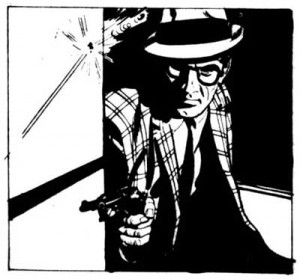 Besides this feature, common to all genres, we can distinguish two main currents, the thriller and the deductive detective novel. In the deductive novel, of which Agatha Christie has become symbolic, I don’t know why, since she is a terrible writer, and not another woman, Ngaio Marsh for example, the main action has already taken place before the detective begins to investigate. The mystery is always a priori. In the thriller, on the contrary, it is the investigation which precipitates most of the events and their outcome. The mystery is always a posteriori. In the one case, it deals with the use of the intellect separated from practice; in the other it deals with action, and the intellect is used to compare successive contradictory moments of practice. In the thriller the truth is the result of action not in a epistemological scheme but in the sense that the actions of the detective causes other actions and reactions and the truth is one of these actions, which closes down the plot and explains all the other actions. Whereas in the deductive novel the truth exists before the story begins and the role of the detective is to bring it out, at the start of the thriller each of the protagonists are ignorant of the truth because it doesn’t yet exist and the role of the detective is to precipitate a chain of events which will cause the characters to confront their own truth. The deductive novel has the function of discovering the truth, the thriller aims to construct it.
Besides this feature, common to all genres, we can distinguish two main currents, the thriller and the deductive detective novel. In the deductive novel, of which Agatha Christie has become symbolic, I don’t know why, since she is a terrible writer, and not another woman, Ngaio Marsh for example, the main action has already taken place before the detective begins to investigate. The mystery is always a priori. In the thriller, on the contrary, it is the investigation which precipitates most of the events and their outcome. The mystery is always a posteriori. In the one case, it deals with the use of the intellect separated from practice; in the other it deals with action, and the intellect is used to compare successive contradictory moments of practice. In the thriller the truth is the result of action not in a epistemological scheme but in the sense that the actions of the detective causes other actions and reactions and the truth is one of these actions, which closes down the plot and explains all the other actions. Whereas in the deductive novel the truth exists before the story begins and the role of the detective is to bring it out, at the start of the thriller each of the protagonists are ignorant of the truth because it doesn’t yet exist and the role of the detective is to precipitate a chain of events which will cause the characters to confront their own truth. The deductive novel has the function of discovering the truth, the thriller aims to construct it.
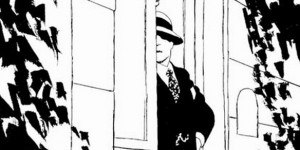 In the thriller the detective behaves exactly contrary to an inspector created by Dickens who says “It’s of no use moving if you don’t know what your move is. You had better by far keep still.” [2] Taking this to the extreme, Nero Wolfe, by Rex Stout, the obese detective who only left the dining-room or the office to go to the greenhouse to see the orchids and resolved everything solely by deduction and brain power. On the contrary, when the detective in a thriller doesn’t know the position of various pieces it is exactly then that he acts and with this movement gets to discern it. The girlfriend of one of them shows that she understood the hub of the matter when she said “I’ll bet you plan to keep blundering along annoying people, and see what happens” [3] In the thriller, contrary to what happens with the Dickensian inspector or with Nero Wolfe, the very mobility of the detective functions as part of the action. As one private investigator said, explaining to the reader what the best approach was; “if he didn’t act, everyone would notice. Sometimes people begin to be restless even before they notice that he didn’t act. And when they’re restless they are on the defensive. Since they don’t get the push that they expected from the enemy they lose their equilibrium. And all that is needed is to keep them in this state of disequilibrium for long enough.” [4]
In the thriller the detective behaves exactly contrary to an inspector created by Dickens who says “It’s of no use moving if you don’t know what your move is. You had better by far keep still.” [2] Taking this to the extreme, Nero Wolfe, by Rex Stout, the obese detective who only left the dining-room or the office to go to the greenhouse to see the orchids and resolved everything solely by deduction and brain power. On the contrary, when the detective in a thriller doesn’t know the position of various pieces it is exactly then that he acts and with this movement gets to discern it. The girlfriend of one of them shows that she understood the hub of the matter when she said “I’ll bet you plan to keep blundering along annoying people, and see what happens” [3] In the thriller, contrary to what happens with the Dickensian inspector or with Nero Wolfe, the very mobility of the detective functions as part of the action. As one private investigator said, explaining to the reader what the best approach was; “if he didn’t act, everyone would notice. Sometimes people begin to be restless even before they notice that he didn’t act. And when they’re restless they are on the defensive. Since they don’t get the push that they expected from the enemy they lose their equilibrium. And all that is needed is to keep them in this state of disequilibrium for long enough.” [4]
The intellectualism and the dislike of action suffices to denounce the profoundly elitist (if not just plainly pretentious and snobbish) nature of the deductive detective novel. Generally these writers go further and the vast majority have it as a rule that the crime can never be committed by ordinary people. Maybe these novels were appreciated by the British bosses of counter espionage which in the Second World War refused to admit that one of the servants of the British Embassy in Ankara was a spy for the Third Reich. But he was. And even if they weren’t habitual readers of the deductive detective novel they were at least a product of the same education in the same elite schools, closing their eyes to the existence of the nouveax-riche and fooling themselves into mixing up caste with class. Robert Altman’s film Gosford Park was all the more effective a criticism of these elites by using the formal conventions of the deductive detective novel but in reality turning these mechanisms on their head showing that while the help assured the necessary production line to keep the bosses alive they could also kill them.
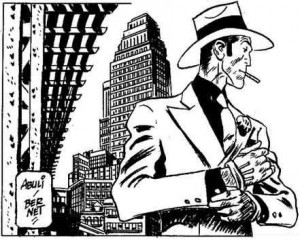 The film, The Sleuth, directed by Mankiewicz confronts the deductive detective novel, snobbish and a priori, with the thriller, popular and a posteriori, to show at last where the superiority of the thriller lies. In the cloistered atmosphere of an English country house two personalities confront each other. One of them, the aristocratic author of deductive plots (Laurence Olivier) sets the trap into which should fall his wife’s lover, a man of the people, a hairdresser, son of immigrants (Michael Caine) and according to this ingenious prediction the murderer would appear publicly to be someone who was able to solve the mystery. But the trap has a weak point presuming that the victim wouldn’t deliberately put his life in jeopardy, when in the end the hairdresser prefers to die so that his death would compromise the aristocratic amateur detective. The film ends with the terrorised look of the murderer who you see holding a corpse while the red lights of the police cars begin to light up the windows of the mansion. In choosing the rules of the deductive novel, which he himself used as an author, the vindictive husband felt safe because in this type of literature all the facts are presented as past and can’t be questioned. But by using the rules of the thriller the victim inverted the situation because in this style the facts depend on action, the plot is always open and everything is left to the future.
The film, The Sleuth, directed by Mankiewicz confronts the deductive detective novel, snobbish and a priori, with the thriller, popular and a posteriori, to show at last where the superiority of the thriller lies. In the cloistered atmosphere of an English country house two personalities confront each other. One of them, the aristocratic author of deductive plots (Laurence Olivier) sets the trap into which should fall his wife’s lover, a man of the people, a hairdresser, son of immigrants (Michael Caine) and according to this ingenious prediction the murderer would appear publicly to be someone who was able to solve the mystery. But the trap has a weak point presuming that the victim wouldn’t deliberately put his life in jeopardy, when in the end the hairdresser prefers to die so that his death would compromise the aristocratic amateur detective. The film ends with the terrorised look of the murderer who you see holding a corpse while the red lights of the police cars begin to light up the windows of the mansion. In choosing the rules of the deductive novel, which he himself used as an author, the vindictive husband felt safe because in this type of literature all the facts are presented as past and can’t be questioned. But by using the rules of the thriller the victim inverted the situation because in this style the facts depend on action, the plot is always open and everything is left to the future.
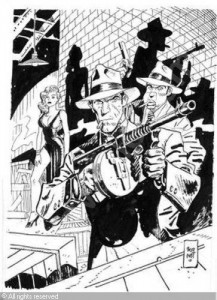 Another confrontation between these two types of detective literature is found in The Burglar in the Library by Lawrence Block, a little marvel of intelligence because in a plot constructed according to the rules of the traditional English deductive novel the crimes are committed and solved according to the style of the thriller. “It was a Raymond Chandler case,” explains the detective who solves the mystery. “Once I realised that, I went out and took action, instead of trying to put the pieces together like some English gentleman assembling a jigsaw puzzle in his drawing room.”[5].
Another confrontation between these two types of detective literature is found in The Burglar in the Library by Lawrence Block, a little marvel of intelligence because in a plot constructed according to the rules of the traditional English deductive novel the crimes are committed and solved according to the style of the thriller. “It was a Raymond Chandler case,” explains the detective who solves the mystery. “Once I realised that, I went out and took action, instead of trying to put the pieces together like some English gentleman assembling a jigsaw puzzle in his drawing room.”[5].
Contrary to what happens with deductive style fiction, the thriller is always popular and when it is ideologically right-wing it is fascist never aristocratic. Sometimes, it so happens that it is a bit here and there, mixing up the extremes. James Ellroy, for example, claims to hail from the extreme right but his novels can be – I would say should be – read as extreme left works. Despite this, there is no doubt that the maniacal fury of Ellroy’s characters is the same as that which drives Mike Hammer, sewer dweller obsessed by purity, the urban crusade created by the anticommunist Mickey Spillane. But whatever the position occupied by the extremes of the political spectrum the position of the thriller relative to the deductive novel is clear. It’s the ordinary man novel against the novel of the elite.
To this affect the names Thriller and the Noir are synonymous even though some writers claim that the Noir should be used only for detective novels which deal with social reality. [6]. But economic questions usually occupy the front seat of thrillers because passion gets confused with greed in a sole obsession and obsession tends to veer more to the sordid than the idyllic.
Underlying the detective drama action is the contradictory articulation of two economic regimes. Capitalism where legal society takes place and which the police protect. Then there is the system of the exchange of gifts and its opposite, the exchange of insults and pillage which governs the norms and ambitions of the gangsters. Crime consists in the passage of money from the legal capitalist regime to the gangster regime of the exchange of gifts. Between these two worlds there is only one means of transaction, robbery, which brings along with it insult and vengeance. It would be difficult to find a better expression of this dialectic than in the book by Albert Simonin where the bad boy Paul recalls his apprenticeship from his uncle, hoodlum and occasional pickpocket. “The fools” explained his uncle “have the cash, the clever ones take it from them”. And when the nephew asks “And do the clever ones who take possession of the cash from the fools turn into fools too?” The uncle burst out laughing and explained “No way, my boy…We know what the cash is for! We spend it… can you see the difference?” [7]. The exchange of gifts or Potlatch balances the pillage and the extravagance and the gambling follows the robbery, two extremes of the same structure. When they are not robbing the fools the clever ones drink and play cards and it is in this horizon that the action of classical thrillers endlessly repeat themselves.
However, it is repeating itself less and less or it is now relegated to the periphery by economic concentration which is happening to the gangsters and large legal fortunes alike. James Ellroy deals with this new feature in his USA Trilogy, an interpretation of the history of the United States in which fascism was unnecessary due to the triple alliance between the director of the FBI, J Edgar Hoover, Big Capital represented by Howard Hughes, and organized crime represented by its business expressions in Las Vegas. It is the history of the US in the 1960s recreated by Ellroy. Gangsterism became an integral part of political life and the official economy or more exactly it merged into this political system and economy. In the novel Blood’s a Rover, James Ellroy shows this fusion already complete in the Nixon administration. From Red Harvest by Dashiell Hammett to Blood’s a Rover is the outline of the convergence of gangsterism and official political economy, a movement which led to the success of North American society throughout the twentieth century.
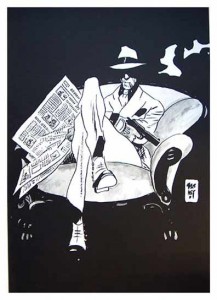 If we search for the precursor of the thriller in scholarly literature the place of distinction must go to Dostoyevsky, who was always interested in fait-divers and from this conferred onto his characters a psychology of action. Nietzsche was inspired – badly, but he was inspired – by Dostoyevsky and Freud only understood Dostoyevsky from what Nietzsche had gotten wrong. No wonder Freud had explained things backwards. It is in another direct disciple of Dostoyevsky where we see the psychology of action raised to a plan of the pure act when Andre Gide, in Lafcadio, created the character as adventure. Taking the novels of Noir as Thrillers the thriller found its classic expression in Dashiell Hammett and Raymond Chandler and its best successors were James Cain, James Hadley Chase, Ross MacDonald and today James Ellroy. There are also thousands of successors, some good, almost as good as the masters except that they don’t have that original freshness.
If we search for the precursor of the thriller in scholarly literature the place of distinction must go to Dostoyevsky, who was always interested in fait-divers and from this conferred onto his characters a psychology of action. Nietzsche was inspired – badly, but he was inspired – by Dostoyevsky and Freud only understood Dostoyevsky from what Nietzsche had gotten wrong. No wonder Freud had explained things backwards. It is in another direct disciple of Dostoyevsky where we see the psychology of action raised to a plan of the pure act when Andre Gide, in Lafcadio, created the character as adventure. Taking the novels of Noir as Thrillers the thriller found its classic expression in Dashiell Hammett and Raymond Chandler and its best successors were James Cain, James Hadley Chase, Ross MacDonald and today James Ellroy. There are also thousands of successors, some good, almost as good as the masters except that they don’t have that original freshness.
If a blind bard put all these adventures into a single novel we’d have the Iliad of urban society. But even without such a synthesis these thousands of books exist as a whole with their immutable characteristics which give them their style. Because of this they are classics.
2. The Isolation.
Solving the mystery through his own actions how can the detective in the thriller survive in the midst of danger? It’s because his action is entangled with his journey and he is always zigzagging between the antagonists. The detective survives because he plays the various factions and puts each one against the other. He is the master of contradiction, in the sense of the dialectic proposed by Mao Tse-tung. While in the deductive novel he is set in space, in the thriller he is permanently on the move.
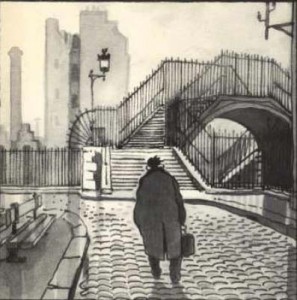 Because of this the thriller requires a democratic society like the United States where social position is exclusively measured by money and whatever his status allows a poor person, if he is not a beggar, to speak to a rich person as long as he doesn’t expect the rich person to invite him to his receptions. Moreover, labour in the United States is too expensive for rich people to surround themselves with lots of servants which would build an insurmountable barrier between them and the rest of society. In France, for example, Maigret, created by George Simenon, needs to use his administrative authority as a commissioner for members of the elite or even the upper middle classes to reluctantly open their doors. The journey of the poorly paid private detective in search of information would be impossible in the Old Europe where to frequent all the social milieus the police could not be private. Indeed, this meandering is one of the fundamental rules of the thriller because without it the detective cannot get what he most wants, information. “I like to move into people’s lives and then move out again” says one of them, Lew Archer, to a woman he met in passing. And when hours later she recalls “You said at dinner you like to move in and out of people’s lives”, he explains “That’s true. Particularly the people I meet in my work” [8]. But when he leaves someone’s life he doesn’t leave empty-handed.
Because of this the thriller requires a democratic society like the United States where social position is exclusively measured by money and whatever his status allows a poor person, if he is not a beggar, to speak to a rich person as long as he doesn’t expect the rich person to invite him to his receptions. Moreover, labour in the United States is too expensive for rich people to surround themselves with lots of servants which would build an insurmountable barrier between them and the rest of society. In France, for example, Maigret, created by George Simenon, needs to use his administrative authority as a commissioner for members of the elite or even the upper middle classes to reluctantly open their doors. The journey of the poorly paid private detective in search of information would be impossible in the Old Europe where to frequent all the social milieus the police could not be private. Indeed, this meandering is one of the fundamental rules of the thriller because without it the detective cannot get what he most wants, information. “I like to move into people’s lives and then move out again” says one of them, Lew Archer, to a woman he met in passing. And when hours later she recalls “You said at dinner you like to move in and out of people’s lives”, he explains “That’s true. Particularly the people I meet in my work” [8]. But when he leaves someone’s life he doesn’t leave empty-handed.
Playing the various fields the detective of the thriller gathers information which is the only source of his power. If he often appears to us to be defenceless against the numerous deadly and armed enemies he has another type of weapon, maybe less lethal, but much more effective –information. Travis McGee a well paid adventurer puts information on a scale of values. “Except for those whose job it is to kill folks, having to use a gun is the end product of stupid procedure. It is a handy way of correcting mistakes, so the only time to carry it is when you head into an area where a lack of information compounds the possibility of the inadvertent mistake.” [9] The detective can only survive by offsetting rival factions, confronting one with information gathered from the other and, for this, he sometimes has to invent it. This bluff comes from the pressing need to have information at a time when nothing is known and can be defined as an invention of facts arising from a practical necessity. To the extent, however, that one of the sides believes in the bluff raises practical consequences. The detective is the master of bluff because he is able to make the bluff real.
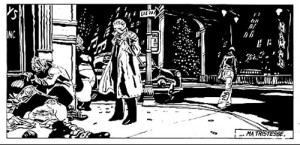 The strength of the detectives of the thriller comes from the uniqueness of his position. Since he is the only one navigating between the fields, he is always a loner. When he has a partner he leaves him sitting in the office and acts alone or his partner gets killed in the first chapter. And if Travis McGee, created by John D. MacDonald, has a friend and confident – as unlikely as his job as an economist – he always remains on the sideline and the action only can be taken by the adventurer. While it’s true that in the novels of Robert B. Parker, Spenser is often accompanied by Hawk, but only when he needs back-up or someone with contacts in the black underworld and despite his sense of irony and mystery Hawk always remains on the margins.
The strength of the detectives of the thriller comes from the uniqueness of his position. Since he is the only one navigating between the fields, he is always a loner. When he has a partner he leaves him sitting in the office and acts alone or his partner gets killed in the first chapter. And if Travis McGee, created by John D. MacDonald, has a friend and confident – as unlikely as his job as an economist – he always remains on the sideline and the action only can be taken by the adventurer. While it’s true that in the novels of Robert B. Parker, Spenser is often accompanied by Hawk, but only when he needs back-up or someone with contacts in the black underworld and despite his sense of irony and mystery Hawk always remains on the margins.
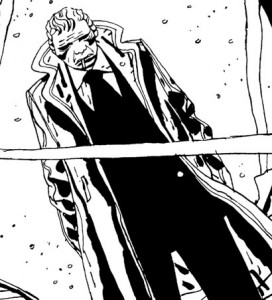 Even in the rare occasions where he works in a huge investigation company, like Continental Op, created by Dashiell Hammett, the detective always acts alone. Between the world of gangsters and the world of fools there is only one link, robbery, topped up by insults and vengeance. And against the personal action, which in the milieu of gangsters sustains the system of exchanging gifts and pillage, rises up the bureaucratic action, the only one which the capitalist system knows, and it is this anonymity of the police which in reality has the job of punishing the law-breakers. But I don’t know of any writer who has found a stylistic solution to this disequilibrium between the personal and the anonymous. The plots of the novels of John Le Carré lie in bureaucratic intrigue but he is the great master of spy literature as well as a master of any type of literature. Well the spy genre has very different characteristics to the detective novel and the fact that, in his only detective novel “A Murder of Quality,” Le Carré has put George Smiley acting alone, outside the ministerial corridors and high level meetings, is another argument to confirm the stylistic disequilibrium between the compulsory personalisation of the detective in detective fiction and the anonymity of the police in bureaucratic reality. For this the detective novel can be realistic as regards the criminals but never for the investigators.
Even in the rare occasions where he works in a huge investigation company, like Continental Op, created by Dashiell Hammett, the detective always acts alone. Between the world of gangsters and the world of fools there is only one link, robbery, topped up by insults and vengeance. And against the personal action, which in the milieu of gangsters sustains the system of exchanging gifts and pillage, rises up the bureaucratic action, the only one which the capitalist system knows, and it is this anonymity of the police which in reality has the job of punishing the law-breakers. But I don’t know of any writer who has found a stylistic solution to this disequilibrium between the personal and the anonymous. The plots of the novels of John Le Carré lie in bureaucratic intrigue but he is the great master of spy literature as well as a master of any type of literature. Well the spy genre has very different characteristics to the detective novel and the fact that, in his only detective novel “A Murder of Quality,” Le Carré has put George Smiley acting alone, outside the ministerial corridors and high level meetings, is another argument to confirm the stylistic disequilibrium between the compulsory personalisation of the detective in detective fiction and the anonymity of the police in bureaucratic reality. For this the detective novel can be realistic as regards the criminals but never for the investigators.
In capitalism, the lone private policeman is an archaic professional figure and a vestige of an era so outmoded as the economy of exchanging gifts which govern the gangsters. But the thriller cannot cope with the impersonal nature of the bureaucratic police. Some writers, using the backdrop of a police force whose conformist members look all the same, single out an oddball like the renowned Commissioner Maigret or a black sheep like Inspector John Rebus in the novels of Ian Rankin which, in the context of the isolation in which they operate, can act with an individualism just like the private detective. Despite having numerous staff at their disposal these police officers act outside any real team work. Rebus cannot overlook “just why he didn’t fit, why he was so unsuited to the career life had chosen for him”. An investigation unit “was like a production line”, “you were a small part of a very large team” while he, on the contrary, “wanted to follow up every lead personally” [10]. With an even greater alcoholic breath, Harry Hole, detective of the Criminal Division of the Oslo Police is “the lone wolf, the drunk, the enfante terrible of the department” [11] carrying out his own investigation and against everyone. Or even as ensues in a book by Qiu Xiaolong, Death of a Red Heroine, the Chief Inspector Chen Cao must work alone when other authorities see him as treading on politically dangerous ground.
Even Ed McBain who tries to portray a police bureaucracy but can only bring-together in the 87th Precinct a number of individual characters, blending – to use Weberian terms – bureaucracy with an addiction to charismatic characters. But, all in all, and even taking the villains into account McBain presents an idyllic vision of life in the precinct if we compare it to the frenzy of bloody internal struggles which James Ellroy describes in the 1950s Los Angeles Police Department in L.A. Confidential, to such an extent that – and I know of no other example in detective literature – criminal intrigue is carried from the gangster milieu to the police milieu. But just as in the numerous novels of Ed McBain and in L.A. Confidential, what we are left with is not so much a bureaucracy but a collection of entirely individualised personalities who are condemned to work or tear themselves to pieces within the same four walls. In both cases this multi-personalisation is revealed in the very structure of the fiction because the perspective keeps on changing whenever another policeman arrives without there ever being one point of view capable of expressing the totality of the police bureaucracy.
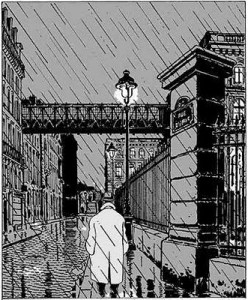 The detective or the police just as the gangsters or other criminals are situated on the same level of a personal duel and are up against the same weapons of insults and vengeance. This explains why the private detective or the eccentric policeman are frequently found between two type of enemies, the gangsters who carry out their business but have opposing interests and the police bureaucracy which despite, in principle defending the same interests, have strong objections to the detective’s individualistic behaviour. In the thriller isolation is not about being alone but being in the wrong company. In each camp the detective is out of place. And what is his proper place if not necessarily being in strange places, in a journey without end?
The detective or the police just as the gangsters or other criminals are situated on the same level of a personal duel and are up against the same weapons of insults and vengeance. This explains why the private detective or the eccentric policeman are frequently found between two type of enemies, the gangsters who carry out their business but have opposing interests and the police bureaucracy which despite, in principle defending the same interests, have strong objections to the detective’s individualistic behaviour. In the thriller isolation is not about being alone but being in the wrong company. In each camp the detective is out of place. And what is his proper place if not necessarily being in strange places, in a journey without end?
The lack of horizons which make up the landscape of big cities, the high walls which demark the streets pounded by the detective in the thriller also dictate the psychology confining him within his limits as a wage-earner or restricting him to the terms of his contract. And the same barriers imprison the other characters, involuntary actors who do not see beyond their own drama. All of them are one-dimensional, not because they lack traces of humanity but because the humanity they live doesn’t give them a chance of being anything other than what they are. The path of the detective is not the voyage of Ulysses because the solution he reaches is as devoid of lessons as the crime was of grandeur. The detective in the end learns nothing more about himself than what he knew in the beginning. The truth he discovers is scrawny! He discovers who committed the crime but not what the crime was and even less about what crime is. He never escapes his sordid destiny.
This confinement to being one-dimensional brings despair and obsession, the two sides of the same fatal destiny. It is not about a supernatural destiny. Destiny exists because there is no social outlet for the situations in which the characters find themselves. Because of this, destiny is not redemptive like in Christianity, nor heroic like in Greek tragedy. It’s always sordid and the obsession is the fulfilment of this destiny. The characters in a thriller populate a Spinozan universe where necessity is just another name for what exists and freedom is nothing more than the consciousness of this necessity. Without ever being able to rise to the consciousness which Spinoza intended, clear and appropriate, the characters of a thriller however understand the burden of need and act as blind instruments. They are victims of passion but without fooling themselves because they don’t think they can change anything through rage, rancour or desire. They obey their passions as though they are following a destiny which is taking them they don’t know where but they know there is no other path for them. Werner Herzog is right to attribute to the detective in Bad Lieutenant the same furious obsessive search as the unreal aim of the hero of his film Aguirre.
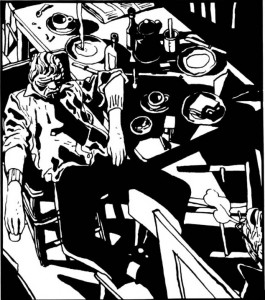 One-dimensional, obsessed in carrying out their professional needs, pursuing some monomaniacal pleasure or in making a fortune, the characters of the thriller are compulsive and confuse freedom with the strength of this impulse. Are these the typical conditions of a capitalist urban society? Yet the Russian Nikolai Leskov, living in a very different context and using a provincial and rural literary style, wrote “Lady Macbeth of the Province of Mtsensk” in 1865 which anticipated the best thrillers, except in a paragraph of three or four lines. However I don’t believe my analysis is wrong but it must go deeper and be brought to a higher level. Could it be that in thrillers those limited existences of the detective and the villains transcend – as in the end, all classics do – the limits of everyday life and its epoch in order to enlighten something more profound in the human being?
One-dimensional, obsessed in carrying out their professional needs, pursuing some monomaniacal pleasure or in making a fortune, the characters of the thriller are compulsive and confuse freedom with the strength of this impulse. Are these the typical conditions of a capitalist urban society? Yet the Russian Nikolai Leskov, living in a very different context and using a provincial and rural literary style, wrote “Lady Macbeth of the Province of Mtsensk” in 1865 which anticipated the best thrillers, except in a paragraph of three or four lines. However I don’t believe my analysis is wrong but it must go deeper and be brought to a higher level. Could it be that in thrillers those limited existences of the detective and the villains transcend – as in the end, all classics do – the limits of everyday life and its epoch in order to enlighten something more profound in the human being?
What distinguishes the detective, morally, from other characters? Sometimes, very little, sometimes nothing at all, all of them are cruelly obsessed. The private investigator receives a remuneration to do a job. A wage earner in a society of wage earners, his honesty consists in doing exactly what he is paid to do, and from that comes an uncompassionate coldness. To such an extent, that in one of the novels of James Hadley Chase, – translated into French with the magnificent title of “Douze Chinetoques et une Souris” which literally means twelve Chinese and a girl, but whose slang is lost in translation – the detective Dave Fenner infiltrates the world of the gangsters of Key West so successfully that he become just like them in everything, even violence and amoralism. Parodying Hammett’s detective, for whom the service contract with the client is the only moral standard, and extrapolating exponentially the contradictions of a lack of honesty to business terms, Fenner causes a great massacre among the gangsters of Key West in order to get revenge for a client whom he believes to have been killed and whose role was falsely taken by a young woman who is the main source of corruption in that milieu. And finally when he leaves the surviving gangsters to their miserable destiny Fenner tells her that he will say nothing to the police even though he doesn’t like her nor the people around her, and explains: “As for you, you’re still my client, for the time being” [12] even though it is a false client and that it was this deception that started the tragedy. Fenner takes amorality to an inversion of morality.
An outgrowth of thrillers, but which unmasks them morally, is the type of novel where there are no police and the action takes place only between gangsters. An excellent example of this genre is the work of Albert Simonin, a master of slang. But the rules here are the same and each gangster functions like a police force for the other gangsters, their enemies or rivals, and confirms the profound similarity in the behaviour of the detective and the bandit in action detective novels.
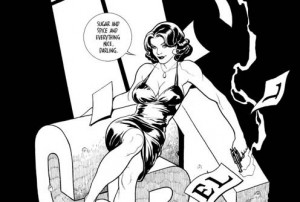 And even though the detective and the gangster can opt for opposite values, the idea that they have of these values is the same and the rules of the game are the same. Hovering over the thriller is the great question asked by Smerdiakov “So, if there is no God then everything is allowed.” But in the end nothing is allowed because given the one-dimensional nature of the characters the option is not between good and evil but between evil and death, between accepting what it is, and living, and refusing what it is, and dying. Being willing to die is the only thing that distinguishes the detective from banal criminals and what he has in common with the most extreme and obsessive of the great criminals. In this vicious circle the moral is reduced to the absurd.
And even though the detective and the gangster can opt for opposite values, the idea that they have of these values is the same and the rules of the game are the same. Hovering over the thriller is the great question asked by Smerdiakov “So, if there is no God then everything is allowed.” But in the end nothing is allowed because given the one-dimensional nature of the characters the option is not between good and evil but between evil and death, between accepting what it is, and living, and refusing what it is, and dying. Being willing to die is the only thing that distinguishes the detective from banal criminals and what he has in common with the most extreme and obsessive of the great criminals. In this vicious circle the moral is reduced to the absurd.
When the words of Marlowe, the detective created by Raymond Chandler, come to mind – and I quote from memory – “to be tough enough to survive and tender enough to make it worth living” I ask myself if Che Guevara plagiarised Chandler because he too said “you need to be tough but never lose your tenderness”. The detective is always alone relative to other men but to women also. What would happen to thrillers if publishers insisted on being politically correct? How could private investigators survive in this era of ideological puritanism when misogyny is one of the main characteristics of action detective novels?
In his despair the detective seeks in the woman someone who can overcome his isolation. Never has love held up a mirror as its best metaphor than in the thriller. But the reader knows that this is an illusion and that isolation is another name for the furious rage which isolates the characters. The women are criticised for not corresponding to the myth of femininity, this is their unpardonable fault. But if they were to correspond to this image how could they survive in such a cruel world? Perversity and hypocrisy are the strength of these physically weak women who cannot use violence against the men they deal with. The detective would like to see himself just once in the mirror of pity in the face of a woman. But at the end of the novel the image that the woman reflects is just as tough as his own. The misogyny and its corresponding myth of female purity represent the bad conscience of our society.
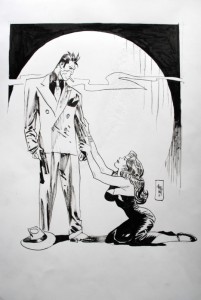 Let’s return to the contrivance of the politically correct because this new type of fashionable feminism is exactly this bad conscience. Andrew Klavan unmasked these procedures in Shotgun Alley where academic feminism is exposed for what it is, a mixture of puritanism designed to prevent the scared woman from giving in to pleasure, and a university department careerism where promotion is easier when men are not allowed to compete. If, in the thriller, being a woman is the crime of women in the world of the politically correct being a man is the crime of men. And even here, if they only knew it, the frustration of the politically correct feminists – albeit in a farcical way– duplicates the isolated machismo of the thriller.
Let’s return to the contrivance of the politically correct because this new type of fashionable feminism is exactly this bad conscience. Andrew Klavan unmasked these procedures in Shotgun Alley where academic feminism is exposed for what it is, a mixture of puritanism designed to prevent the scared woman from giving in to pleasure, and a university department careerism where promotion is easier when men are not allowed to compete. If, in the thriller, being a woman is the crime of women in the world of the politically correct being a man is the crime of men. And even here, if they only knew it, the frustration of the politically correct feminists – albeit in a farcical way– duplicates the isolated machismo of the thriller.
Such is today’s depressive world. What became of the Apollonian heroes of the first thrillers? Sam Spade never had a guilty conscience or moral hesitations and did what he had to do without feeling guilty. Later the guilt complex began to get hold of Philip Marlowe and later still became the constant companion of Lew Archer. Finally for Matthew Scudder guilt is an ever present obsession which takes him to church, or to read the lives of the Saints in his hotel room or attend AA meetings. In each decade it seems the detective drags a cross which is even heavier than the previous one but what does this show, an evolution in the style of thrillers or the evolution of North American society? Yet the Scot, John Rebus is a victim of the same guilt which afflicts his colleagues on the other side of the Atlantic. In his Black Book he even looks for a priest to confess to and the English detective Billy Rucker (created by Adam Baron) lives surrounded by a web of guilt from which he is unable – or doesn’t even try – to free himself. In the greatest of thriller writers today, James Ellroy, it is the morbidity of the public confession of masturbating voyeurs, personified in figures with which the author identifies, which serves to synthesise the main characteristic of the detective, looking at others, spying on their lives, secretly inserting themselves in them, in a confined world of streets and walls where the only escape is to look into the next room. In such a landscape the presence of a detective like Spencer, is refreshing, so confident in himself, in his physique, in his intelligence and his feelings and his sexuality and the colour of his skin, and ironically so above the politically correctness of this latest guilt complex found in the language. But it is only a dim light which illuminates nothing.
(Translated from the Portuguese by Phil Meyler)
Notes
[1] Lawrence Block, The Burglar in the Library, Harpenden: No Exit Press, 1998, p 200.
[2] Charles Dickens, Our Mutual Friend, London: The Folio Society, p151.
[3] Robert P. Parker, Widow’s Walk, Harpenden: No Exit Press, 2002 p60.
[4] M.-E Chaber, La Saison du Bourreau, Paris: Gallimard (Série Noire), 1953, p45.
[5] Lawrence Block, The Burglar in the Library, Harpenden : No Exit Press, 1998, p331.
[6] Jacques Baudou e Jean-Jacques Schleret (orgs), Le Polar, Paris: Larousse, 2001 p6.
[7] Albert Simonin, Hotu Soit qui Mal y Pense, Paris : Gallimard (Série Noire), 1971 p76.
[8] Ross McDonald : The Goodbye Look, New York : Bantem Books 1974 pp 96, 110
[9] John D McDonald, Darker than Amber, New York: Fawcett Crest, 1995, pp102-3
[10] Ian Rankin, Mortal Causes, in Three Great Novels, London: Orion, 2003, p546
[11] Jo Nesbø, The Devil’s Star, New York, Harper 2011, p 13
[12] James Hadley Chase, Douze Chinetoque et une Souris, Paris: Gallimard (série Noire), 1948 p 249.


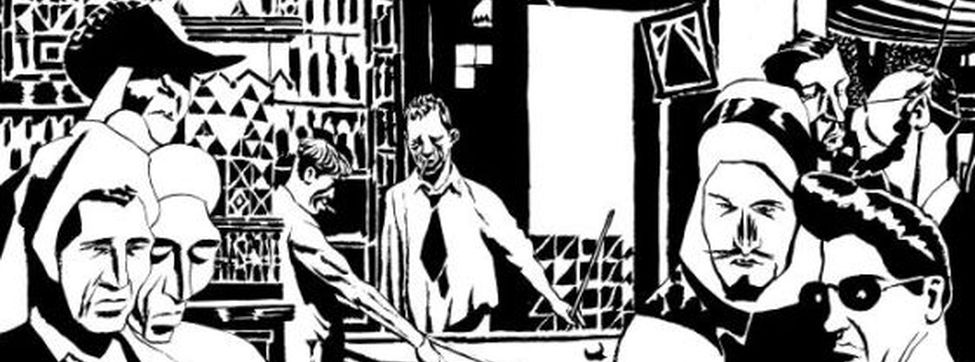




Interested in fact based espionage and ungentlemanly officers and spies? Try reading Beyond Enkription. It is an enthralling unadulterated fact based autobiographical spy thriller and a super read as long as you don’t expect John le Carré’s delicate diction, sophisticated syntax and placid plots.
What is interesting is that this book is apparently mandatory reading in some countries’ intelligence agencies’ induction programs. Why? Maybe because the book has been heralded by those who should know as “being up there with My Silent War by Kim Philby and No Other Choice by George Blake”. Maybe because Bill Fairclough (the author) deviously dissects unusual topics, for example, by using real situations relating to how much agents are kept in the dark by their spy-masters and (surprisingly) vice versa.
The action is set in 1974 about a real British accountant who worked in Coopers & Lybrand (now PwC) in London, Nassau, Miami and Port au Prince. Simultaneously he unwittingly worked for MI6. In later books (when employed by Citicorp and Barclays) he knowingly worked for not only British Intelligence but also the CIA.
It’s a must read for espionage cognoscenti but do read some of the latest news articles in TheBurlingtonFiles website before plunging into Beyond Enkription. You’ll soon be immersed in a whole new world which you won’t want to exit.
See https://theburlingtonfiles.org/news_2023_06.07.php and https://theburlingtonfiles.org/news_2022.10.31.php.